Rude Wonders - your Skincare & Bodycare questions answered

My skin is really dull
Q: I’m in my mid-forties and I’ve noticed my skin is looking really dull, and lacks the elasticity it used to have. I use lots of natural creams and oils on my skin and avoid nasty chemicals, but wondered if there’s anything such as vitamins that I could take to help improve it too.
Susie Debice answers: Oestrogen has a major role to play in skin health since it stimulates collagen production keeping skin cells plump and supporting skin tone and elasticity and essentially promoting and maintaining youthful good looks. From mid-40s onwards, levels of progesterone and oestrogen start to decline and this is reflected by a reduction in skin elasticity and the visible signs of ageing start to creep in. Altrient C is a liposomal vitamin C supplement which has been found to have exceptional results in stimulating collagen formation and improving skin elasticity and suppleness. Just three sachets a day has been found to improve skin elasticity by up to 60% making this my ultimate vitamin supplement for skin anti-ageing. Genuine liposomal vitamin C supplements like Altrient C are gaining in popularity and that’s because the liposomal technology deliveries superior absorption and effectiveness compared to other forms of vitamin C such as ascorbic acid.
Party make up
Q. I have a number of parties to attend in the run up to New Year and I am looking for natural but up-to-the-minute cosmetics. I want to go natural because my skin isn’t great in the winter and wearing more make-up than usual can make it dried out and dull. Can you recommend anything?
Ingrid Hume answers: Winter is a great time for feeling toasty and warm, wrapped up in a cozy blanket or settled in front of a fire. But freezing temperatures, cold blustery winds and the central heating being switched on can leave your skin feeling dry, flaky and itchy. Defeat dull, dehydrated skin this winter and make sure you always cleanse, tone and moisturise before applying your make-up as this helps to prepare your skin. Use a moisturiser that contains nourishing ingredients as this helps to soften and hydrate your skin. To give your skin an extra boost of hydration during winter mix your moisturiser with your foundation. This helps to give a lighter coverage without cakeyness.
This winter it is all about the eyes and lips, making them defined. The smokey eye is very popular and easy to create with the Benecos Natural Quattro Eyeshadow palette in smokey eyes. Perfect your pout with a deep, dark and dramatic natural lipstick. Natural lipsticks contain moisturising ingredients which will help to keep your lips soft and free from chapping. Finish off your look with a pink hue on the cheeks and lashings of mascara to give you a bold lash look.
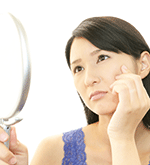
Troublesome autumn skin
Q. I love my skin in summer – it’s blemish-free and sun kissed – but once autumn comes around it starts to dry out and look all blotchy. Can you recommend something that will help me make the transition?
Ingrid Hume answers: Autumn is a lovely time of year but the dehydrating and drying weather along with central heating affects our skin, creating an imbalance and resulting in dry, flaky, blotchy and dull skin. The beginning of the autumn, a new season is the perfect time to re-vamp your skincare products to help balance, purify and nurture post-summer skin.
First of all exfoliate your skin once a week during the autumnal months to remove impurities and flaky skin and promote cell renewal for a soft, smooth complexion. I think you would also benefit from changing your light summer moisturiser into a rich facial oil that contains organic plant oils such as evening primrose, pomegranate or argan oil. These nourishing oils help to nurture, hydrate, promote cell renewal and boost the moisture content in the skin to keep your complexion soft, supple, nourished and radiant so you are able to enjoy the autumnal months without having to worry about your dry, flaky and blotchy skin.
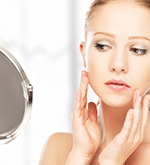
Oily summer skin
Q. My skin gets really oily in the summer and I just seem to have a layer of sweat on it all the time. I have always been really sensitive to heat. Is there anything you can recommend to give me a long lasting make-up finish as I hate to look sweaty at work.
Ingrid Hume answers: Finding yourself a little overheated during the summer with oily skin and streaky make-up can be a hassle for many. To keep your complexion looking cool and matte the key is to keep your make-up light and simple. To start always apply your base make-up onto cool skin, splash your skin with cool water and pat dry. For your base opt for a tinted moisturiser or BB cream instead of a heavy foundation. Heavy foundations tend to slide on oily skin and are not able to stay in place properly resulting in a cakey and uneven complexion. BB creams and tinted moisturisers are light and they absorb into the skin to give a smooth and even complexion. After applying your base make-up, apply mineral powder over your complexion to create a matte effect. Mineral powders are designed perfectly for oily skin in the warmer summer months as they fight shine instead of adding to it, give staying power and create a light, sheer complexion but also allow your skin to breathe. To avoid eyeshadow creasing, apply an eyeshadow primer on your eyelids to give the eyeshadow something to hold onto and give staying power. Finish off with a dusting of powder blusher, eyeliner and mascara.
You can also carry a facial mist with you and when you are feeling a little overheated and need a cooldown spritz it over your skin. This will give your skin a boost of freshness while making your make-up last longer.
Sun protection
Q. I am going on a sun holiday for the first time in a few years and taking my four-year-old daughter. I am a little concerned because she is quite fair skinned and sensitive to the sun and also because she suffers from eczema and I don’t want to make it worse. Can you recommend something natural that might work for her skin and give me some advice on how to prevent her from burning?
Ingrid Hume answers: Going on holiday with little ones can be stressful enough without having to worry about the suitability of sun protection products. With your daughter suffering from eczema and being fair skinned, a natural and organic certified sun cream would be ideal as it’s free from chemicals, synthetics and mineral oils that irritate the skin.
I would recommend as high an SPF as possible, such as the Organii SPF50 Sun Milk, suitable for babies, children and adults, which not only delivers the protection you need, but doesn’t leave the horrible opaque, egg wash residue that natural sun creams can be notorious for.
I would advise applying the sun cream liberally over all exposed skin, not forgetting the back of the neck, ears, lips and tops of feet, which are sometimes overlooked. Don’t forget to reapply after swimming and towelling.
Additional protection such as a wide-brimmed hat and cotton t-shirt will also protect your daughter from over-exposure to the sun, but try to avoid being out in the sun between the hours of 11am and 3pm as this is when the sun’s rays are the harshest. I would also recommend a good natural moisturiser such as the Lavera Aftersun Lotion to use after a day in the sun to replenish and nourish the skin.
Body odour
Q. I am 25 and have an embarrassing problem – I suffer from awful body odour. I shower frequently and use strong antiperspirants, but nothing seems to help. I am embarrassed to go out and think I really need some help.
Thomas James Laird answers: Firstly, I think it’s important to recognise that sweating is our body’s natural mechanism for expelling toxins. Conventional antiperspirants reduce body odour by using synthetic ingredients (including aluminium chlorohydrate) to ‘plug’ the skin’s pores, and artificially impede sweat formation. The kinds of synthetic ingredients that are used can also be found in household cleaning products, and there is ongoing debate about their long-term negative health effects.
Body odour is the result of bacteria breaking sweat down into acids, and the key to reducing this odour is to fight the bacteria at source. Rather than using conventional antiperspirants, which block the pores and hinder the natural biological action of the skin, why not try a natural deodorant?
Natural deodorants have become increasingly popular due to their effectiveness and moisturising properties. They typically contain an ingredient called alum (not to be confused with aluminium), which is a natural mineral salt with a long history of safe use as a deodorant ingredient. Alum has antibacterial properties, which inhibit the growth of odour-causing bacteria on the skin, making it an ideal natural alternative to traditional antiperspirants. Because bacterial growth is reduced, your sweat will have no odour, and hopefully your body confidence will return.
Post-baby hair loss
Q. I am a healthy woman in my 30s with a worrying problem. After my son was born I noticed that there was a lot of hair in the brush after I brushed it and now some months later it is feeling very thin. Is there anything I can do about it?
Dr Jan Wadstein answers: 40-50% of new mums will experience increased hair shedding after giving birth known as ‘postpartum hair loss’, and it is important to understand that this condition is normal, although what you are experiencing can understandably be worrying.
Toward the end of pregnancy the amount of cortisol in the body rises, whilst levels of important proteins for hair growth called proteoglycans drop. At this time the Hair Growth Cycle is artificially ‘stuck’ in the Growth Phase thanks to high levels of pregnancy hormones, but this goes back to normal after birth. The problem is that the combination of high cortisol (usually from stress), low proteoglycans and fewer pregnancy hormones means that hair suddenly starts to transition out of the Growth Phase and causes a large amount of shedding to occur (seemingly all at once).
Specific, targeted products are able to help this situation by shortening the time it takes to return to normal hair growth as a new mum. Nourkrin Post Pregnancy is a safe and drug-free supplement scientifically developed with specific ingredients that kick-start the Growth Phase and support normal Hair Growth Cycle function.
Skin breakouts
Q. I am in my 20s and I had good skin right through my teens, but now I seem to suffer from breakouts and it takes ages for them to get better and my skin to look ok again. Can you suggest any ideas for improving my skin?
Sabina Jennings answers: This is becoming an increasingly common condition in women of your age and older. You don’t mention whether the condition is acne, rosacea, or peri-oral dermatitis - to make sure you are using the best treatment you should visit your doctor to find out. These conditions can have flare-ups and can look very similar. The major cause, however, remains the same for all three skin conditions – inflammation. Yes, hormones play a part, but modern thinking is that inflammation is the major player. Stress, which can come in many forms such as worry, working too hard, playing too hard, and not enough sleep can raise cortisol levels in the body which sets off a pro-inflammatory mode. An inflammatory diet high in sugar-based foods and drinks and processed foods will add to the problem. It’s good to keep a food diary for a week - you’ll be surprised by what you do eat and drink. The diary also helps to make the connection between certain foods and your flare-ups.
The next inflammatory trigger can be skincare products, particularly with sensitive Irish skin. So select a gentle organic cleanser, and shampoos and shower gels that are formulated for sensitive skin. Thoroughly cleanse the skin morning and evening and if necessary apply a light gentle moisturiser. In the case of acne, there are specific natural moisturisers and concealers that have anti-bacterial herbs such as mint, rosemary, tea tree, burdock and willow which help reduce the acne bacterium. If applying make-up, the same rule applies - choose gentle organic make-up that is not going to irritate the skin, particularly when it comes to foundation. If you focus on these three areas - stress reduction, healthy diet and natural skincare products – I think you should see an improvement.
Make-up help
Q. I am a 16 year old girl and I like make-up but my skin isn’t all that great. My mum says I should try more natural products, but I am not sure what to look for. What do I need for a good beauty routine?
Sabina Jennings answers: Well, Avril you must be interested in looking after your skin because you’ve written to Rude Health, so that is your first step on the road to a great complexion. The problem for many people is that conventional make-up can be stuffed with potentially toxic chemicals that can have a detrimental impact on health and ultimately your skin. If you want to try out some natural make-up look for brands that are certified organic or natural from either Natrue, BDIH or Soil Association. These certifications, which are clearly labelled on the products, give you the re-assurance that the ingredients are free from toxic chemicals. Secondly you need a brand whose foundation is formulated for young skin: they will usually have a lesser oil content.
Putting on make-up is only half the story though – you need a simple beauty routine that includes using an organic skin cleanser and moisturiser. Ensure that you cleanse off all your make-up with a milk cleanser before going to bed. If after this your skin feels a little tight, apply a small amount of light moisturising cream. Wash your face in water and moisturise in the morning. Now your skin is ready for your fabulous new natural make-up. Look for fun and affordable colours from Benecos and Lavera available in health food stores.
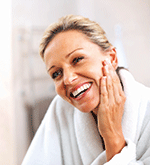
Dry winter skin
Q. I am in my 50s and I suffer from dry skin. It’s not too bad in the summer, but once winter really comes in it can become itchy and sometimes flakes of skin even fall off my face! I end up wearing make-up to cover it up, but I find that it doesn’t help it to improve. Can you suggest anything?
Sabina Jennings answers: Around the time of the menopause our skin becomes drier. The reduction of the hormone estrogen can decrease the skin’s defence against oxidative stress and the skin becomes thinner due to less collagen, decreased elasticity with increased dryness. So it’s really important to moisturise our skin.
Firstly eat plenty of omega 3 essential fatty acids which are found in oily fish such as sardines, mackerel, salmon also in nuts and seeds such as flaxseeds and chia seeds etc. Secondly try to avoid highly scented soaps, as they can be very harsh to the skin. Focus on shower gels and soaps that are organic and for sensitive skin. Choose a cleansing milk that is for very sensitive skin – you’ll find that these are non-astringent and leave the skin soft and supple. Once cleansed, your moisturiser needs to contain a good blend of oils, such as jojoba, almond, safflower, grapeseed, olive fruit oil or coconut etc. These oils ensure the skin is supple throughout the day. Ask your health food shop for help and bear in mind expensive skincare doesn’t mean the best quality. Choose an oil-based foundation or natural mousse make-up for mature skin, which leaves a lovely matte finish. There are some very good organic brands available that are surprisingly affordable given their super ingredients. At the close of the day gently remove the make up with plenty of cleansing milk; avoid rubbing your skin, just use gentle strokes. If your skin feels a little tight, apply a little night cream.
Finally avoid smoking, excessive alcohol, eat plenty of vegetables and in the winter drink adequate amounts of warmed water.

Looking for natural make-up
Q. I am in my 20s and have been reading in Rude Health and other magazines about the harmful ingredients in conventional make-up. I’m trying to eat more healthily and was reading that chemicals go into your body through body and face products. Can you recommend a natural make-up range I can try that has fun colours as well?
Virginie Claire answers: What a great age to start to care for your wellbeing inside and out Mary! Couleur Caramel is the makeup that you are looking for. The Ecocert Certification and BIO Logo are given to all products which guarantees the make-up is natural and organic. Also, if you want to have fun with colours, texture and diversity, Couleur Caramel has an amazing palette of colours with an eco-chic packaging and 100% recyclable. At the same time as being natural, you are treating the skin as you wear it: high in vitamins, minerals and antioxidants, the skin improves versus using synthetic products which can aggravate or dehydrate the skin.
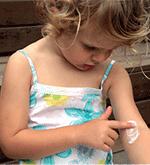
Autumn eczema
Q. My daughter is five and suffers from eczema on the back of her legs and between her fingers – it got worse during the summer when we had very warm weather. I am loathe to put a steroid cream on it, which is what our GP recommends. Are there more natural options available?
Natalie Lamb answers: Conditions such as eczema are said to be a malfunction of the immune system. The gut lining houses approximately 70% of the body’s immune cells, and is lined and influenced by a diverse microflora. Specific beneficial strains appear to stimulate more regulatory or calming immune cells. An imbalanced gut flora is commonly seen in those with eczema and thought to have a pivotal role in the condition. Eczema is often characterized by chronic inflammation and intestinal permeability. Current treatment is to suppress this immune response with various medications. However, as this is the same defence mechanism the body uses to protect us from truly harmful pathogens, their long-term use may not be ideal. In some studies probiotic supplementation has been seen to rebalance the gut flora, improve immune function, reduce severity of symptoms and reduce the need for medication. In this case I would recommend a multi-strain probiotic.
You may also want to avoid chlorinated swimming pools. Natural sea water on the other hand is often found to be very healing for those with skin conditions.
Winter skin
Q. I dread the winter because by Christmas my skin is so awful looking I have to pile on far too much make-up and it looks like a mask. The main problem is dryness and I have tried countless moisturisers but none of them really solve the problem. Should I be looking for something more natural?
Sabina Jennings answers: How we look after our skin and the type of skincare products we use should reflect the changing weather of the seasons. During the winter months, day and night cream moisturisers need to contain anti-ageing ingredients such as Coenzyme Q10, oils such as jojoba, olive fruit oil and almond oil, together with nourishing plant extracts. Cleansing with moisturising organic milk cleansers helps to retain and replenish the moisture in our skin - avoid any cleanser that is astringing and therefore drying. Applying a hydrating face mask once a week is not only being extra kind to yourself, but gives the face a deep cleanse and leaves the skin feeling silky smooth.
Lastly and often overlooked, your foundation or tinted moisturiser also needs to be organic and moisturising. Many foundations contain oils such as olive fruit oil, safflower seed oil, shea butter, sea buckthorn extract and so on. If you want to go a step further and still have good coverage, select an organic mousse make up that is extra rich in hydrating oils, but leaves the skin with a lovely matte look. Try to eat regular amounts of omega 3, either found in oily fish or from nuts and seeds such as walnuts, almonds and flaxseeds as this will help to maintain healthy cell membranes. Also include lots of fruit and vegetables in your diet, especially those which are rich in antioxidants, as they may help protect cells from damage caused by free radicals.
Ageing skin
Q. I am now in my late 40s and have noticed that my skin has lost its elasticity - I would love to be able to turn back time, but failing that is there a natural product I can use to help with anti-ageing?
Jacqueline Newson answers: Sadly as we age, collagen production slows and our skin loses its firmness. Whilst this decline is out of our control, there are ways we can naturally boost collagen levels for a more youthful appearance.
One solution is to boost vitamin C intake. Vitamin C is scientifically proven to play a vital role in the production of collagen, an essential component of the connective tissue that holds our skin together and the protein that gives skin its elasticity. Vitamin C works by activating the enzymes necessary for initiating the reactions that create collagen.
As well as being responsible for the skin’s suppleness, collagen provides the structure for our blood vessels allowing for oxygen, water and other nutrients to be carried to the skin, to help maintain that youthful, plumped up glow. One of the noticeable effects of vitamin C deficiency is that the skin becomes dry and dull and begins to lose tone.
Altrient C is a vitamin C gel capable of delivering a much higher absorption rate than other products on the market. A recent study conducted by Princeton Consumer Research has shown that in just 12 weeks, those who took three Altrient C sachets a day achieved a 61% improvement in the elasticity and firmness of their skin.

Windblown hair
Q. I have very fine hair and it can be a real problem to keep it in good condition over the summer. I love to windsurf on the west coast, which means my hair is constantly in sea water. Can you recommend a natural hair product that will help keep my locks looking good?
Rivka Rose answers: There is nothing better than spending time at the beach. Sun, sea and sand - what more could you ask for? However, it isn’t all bliss when it comes to the damage that the sun and sea can do to our hair. Salt water, sand and the rays of the sun can leave hair dry and damaged. It is important to use products that help replenish the lost moisture, making your hair look and feel healthy and nourished, especially after a long day windsurfing.
Nothing says summer more than the aroma of coconut, and Faith in Nature’s organic, cruelty-free Coconut Shampoo and Conditioner will leave your hair moisturised and shiny with tropical and fresh aromas that you can’t get enough of. Faith in Nature’s Coconut range contains organic coconut oil which has many benefits for hair as it helps inhibit the loss of moisture while adding gloss and shine.
Sensitive skin
Q. I am really looking forward to going to Spain for my holidays but am always concerned about my freckly pale Irish skin. I never get a tan and usually just burn and my skin goes rough. Also I don’t like the smell of chemical-based sun products.
Sabina Jennings answers: The pale, delicate and assuredly beautiful complexion of Celtic skin can often cause problems for the intrepid holidaymaker. So care is needed to protect this sensitive skin with organic mineral sun creams such as Organii SPF50 Baby Sun Fluid Cream. What’s particularly nice about Organii it doesn’t have that whitening effect of many mineral-based creams.
The most important factor whilst on holiday is not to let your skin burn, so avoid the sun if possible between 11am and 3pm. Wearing a wide-brimmed hat is not only fashionable, but very practical in shading your face and neck from strong sun rays. Remember to protect your shoulders, arms and legs with your sun protection factor cream.
To keep your skin moisturised after being in the sun, ensure that the skincare product is organic, deeply moisturising, and specifically formulated for delicate skin. Lavera aftersun lotions are not only nourishing, but they cool and relax the skin. Ask your health food shop for advice for suitable creams. Think organic, think sensitive and cherish your fabulous skin.

Losing hair
Q. I am a woman in my mid 50s and I have noticed that when I wash my hair, more of it is falling out than normal, and sometimes I find some on my pillow in the morning. I am finding this very upsetting and I can’t wear a hat all the time! What can I do to help keep and strengthen my hair?
Dr Jan Wadstein answers: Normal, healthy hair growth is regulated by the body’s hair growth cycle, which is individual from person to person. The normal function of your hair growth cycle can be negatively affected, however, due to many different internal and external factors. Often it is a combination of factors that lead to symptoms of hair thinning and/or hair loss, such as stress, hormonal imbalance, childbirth and genetics.
On average, we lose 50 to 100 hairs per day, so there is no reason to panic. But if you notice an increase in the amount of daily hair shedding it is time to consider a treatment solution. Many nutritional supplement products claim to support hair growth, but they may be nothing more than a simple multivitamin. However, a few supplements can directly support the healthy hair growth cycle.
I always recommend Nourkrin® WOMAN, a proven supplement for hair growth. After my many years of research and practice in the medical field, I am thoroughly impressed with the results I have seen Nourkrin® provide.
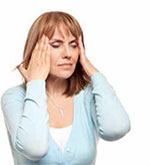
Odour control
Q. What causes intimate odour during the menopause, and what can I do to minimise this?
Eileen Durward answers: While there is a lot of information available about some of the more common symptoms of the menopause, there is one taboo rarely discussed - intimate body odour.
Falling oestrogen during the menopause can affect the production of mucus in the vagina, causing dryness, irritation and sometimes infection. The lack of mucus, which is slightly acidic to deter infection, can also affect the balance of friendly bacteria in the vagina; both of these factors can result in a different odour.
There are a number of different natural steps you can take to minimise this smell. If you are not on any hormonal contraception or HRT you could try a fermented soya supplement to gently raise and balance oestrogen levels, thereby increasing vaginal mucus. You could also take a daily sea buckthorn oil supplement to counter dryness. A probiotic can be helpful, especially in the weeks following antibiotic use, which often affects the vaginal balance of friendly bacteria. Dehydration can be a factor, so remember to drink plenty of water every day.
Shower gels and soaps often contain chemicals which irritate your sensitive, intimate areas - swap to organic and natural alternatives. To avoid possible fungal infections and chafing in the groin area, make sure you wear cotton underwear which will allow your skin to breathe and reduce sweating. Finally, consider using a natural deodorant, like Crystal Spring's Salt of the Earth Crystal Deodorant Spray. Containing skin-soothing aloe vera to ease irritation and anti-bacterial honeysuckle extract, this deodorant works by leaving a thin layer of odour-inhibiting mineral salts on the skin which provide long-lasting protection but importantly do not stop the skin from breathing.

Winter hair
Q. During the winter I tend to pamper myself more and have long relaxing baths. Can you recommend a natural hair treatment that would help to deep condition my dry coloured hair? I find that hair dyes leave my hair very dry and rough.
Michaela Maguire answers: Over-processing the hair by colouring, excessive use of heated styling tools and using the wrong haircare products can all cause damage to the hair, making it look dull, brittle and even cause breakage. It's important to establish a good haircare routine with the correct products for your hair and reduce the use of hair dyes and heated styling tools.
Hair conditioners and treatments work like moisturisers on the face. They hydrate and nourish, making hair healthier, shinier and resilient to damage. When hair has a healthy moisture level it is shiny, has body and is easily managed. Dry, colour-treated hair lacks moisture and requires extra nourishment with a weekly hair treatment such as a hair oil. Add a pea-sized amount of organic argan or almond oil in with your conditioner, massage into the hair and leave on for two to three minutes. Using natural and organic haircare products for dry, colour-treated hair that contain moisturising, nourishing and strengthening natural plant extracts such as mango, rose or green tea will make hair shinier, healthier and more manageable and also the fragrances are gorgeous. Also try colouring your hair with a 100% plant-based herbal hair colour. They colour the hair but also nourish and moisturise without the use of chemicals, synthetic colours or boosters so your hair will look and feel gorgeous, soft and shiny.
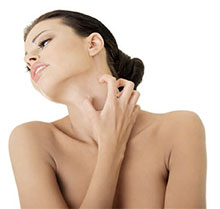
Dry winter skin
Q: I have very dry skin and it is fine during the summer, but as autumn draws in it starts to flake off, become very dry and develop red sore patches. Can you suggest anything natural that I can trust to put on my very sensitive skin?
Michaela Maguire answers: The colder autumn-winter months can be very demanding on your skin. In these months there is less moisture in the air, central heating is on at home and the weather outside is harsh therefore these conditions all have a drying effect on the skin. Skin feels tighter, more sensitive and a lot drier which in your case has resulted in flaky itchy skin.
It is very important to keep skin hydrated in colder months, which can be done through moisturising the skin on a daily basis morning and night. Using a natural and organic face cream which is rich in moisturising and nourishing ingredients such as shea butter, jojoba, almond or macadamia oil is essential to seal in moisture. To help soothe and calm your sensitive skin I suggest using an organic and natural face cream which contains organic calendula, aloe vera or rose as these all have a calming effect on the skin.
Brands such as Lavera, Benecos and Primavera contain these natural and organic ingredients which will help to soothe, calm and moisturise your skin, boosting hydration levels for a soft and radiant winter glow.
Michaela Maguire is proprietor of www.naturalskincare.ie and a natural skincare expert
Click here to read more Rude Health Magazine articles.
Click here to return to the Rude Health Magazine homepage.